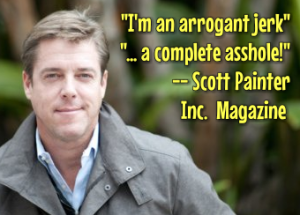- Nov 4, 2012
- 461
- 104
- First Name
- Jessica
Love him or hate him....
This is an honest article about "The Spiral" AKA What the hell happened (happening) with TrueCar.
Scott Painter's tips on surviving screwups:
The TrueCar story would have had a very different ending had Scott Painter not made an impassioned effort to reach out to his critics. Here, some tips on crisis management should you ever face a similar situation.
1. Admit your mistakes--again and again. Painter spent nearly a year apologizing at conferences and meetings. At one, a dealer cut him off mid-speech: "I don't think you really changed! You changed because we're forcing you!" Painter replied, "You're probably right. But I'm here telling you what we did was clearly wrong and doesn't work for you." The room warmed up immediately.
2. Walk the talk. Talk is cheap. You also have to directly address complaints. TrueCar stopped showing consumers estimates of what dealers actually paid for cars and discouraged price wars, revamping its dealer portal by adding a gross-margin calculator and a red alert when a dealer's price falls below the cost of the car.
3. Play by the rules. A disruptive company must conform to existing laws until the legal system catches up to the new technology. Though TrueCar denies that it acts as a broker for car buyers--illegal in some states--it changed its business model to charge a monthly subscription fee in certain states, rather than per deal, and now operates legally in all 50 states and Washington, D.C.
4. Stay responsive. When the dust settles, don't go back to business as usual. Create mechanisms to remain vigilant. TrueCar hired prominent auto-industry executives and created a 20-member TrueCar National Dealer Council that meets six times a year to get updates about TrueCar's operations and give the company feedback to prevent future clashes.
This is an honest article about "The Spiral" AKA What the hell happened (happening) with TrueCar.
Scott Painter's tips on surviving screwups:
The TrueCar story would have had a very different ending had Scott Painter not made an impassioned effort to reach out to his critics. Here, some tips on crisis management should you ever face a similar situation.
1. Admit your mistakes--again and again. Painter spent nearly a year apologizing at conferences and meetings. At one, a dealer cut him off mid-speech: "I don't think you really changed! You changed because we're forcing you!" Painter replied, "You're probably right. But I'm here telling you what we did was clearly wrong and doesn't work for you." The room warmed up immediately.
2. Walk the talk. Talk is cheap. You also have to directly address complaints. TrueCar stopped showing consumers estimates of what dealers actually paid for cars and discouraged price wars, revamping its dealer portal by adding a gross-margin calculator and a red alert when a dealer's price falls below the cost of the car.
3. Play by the rules. A disruptive company must conform to existing laws until the legal system catches up to the new technology. Though TrueCar denies that it acts as a broker for car buyers--illegal in some states--it changed its business model to charge a monthly subscription fee in certain states, rather than per deal, and now operates legally in all 50 states and Washington, D.C.
4. Stay responsive. When the dust settles, don't go back to business as usual. Create mechanisms to remain vigilant. TrueCar hired prominent auto-industry executives and created a 20-member TrueCar National Dealer Council that meets six times a year to get updates about TrueCar's operations and give the company feedback to prevent future clashes.








